RECOMMENDED BOOKS
Energy Shift Books
Energy Shift shares information here and on some other social media outlets that are available 24/7. We know there is no lack of newsletters, blogs and posts to Facebook, Instagram, and many other places about earth science, climate change, renewable energy, oil, coal, fracking, sustainability, etc. It can be, no— it is, overwhelming. It’s information overload.
Another approach is good old-fashioned books! With a modern twist—there is kindle, to keep the number of paper copies down and of course there are libraries, buying used copies of books and sharing books with friends. Energy Shift will share links to books here that we think are worth your time.
Energy Shift Books has published the first in a series of children’s books, I Love the Earth and the Earth Loves Me, available at Amazon.com.
A book for very young children to introduce them to the most basic truths that we face. That the world is beautiful and bountiful, but when we aren’t careful, we hurt our world. Upbeat, not at all scary, the story opens the eyes of the child and the older person reading the book aloud, to our shared responsibility to live lightly on the earth—to love it. The message is intended for the adult, or older child, as well as the little one being read to or that is learning to read.
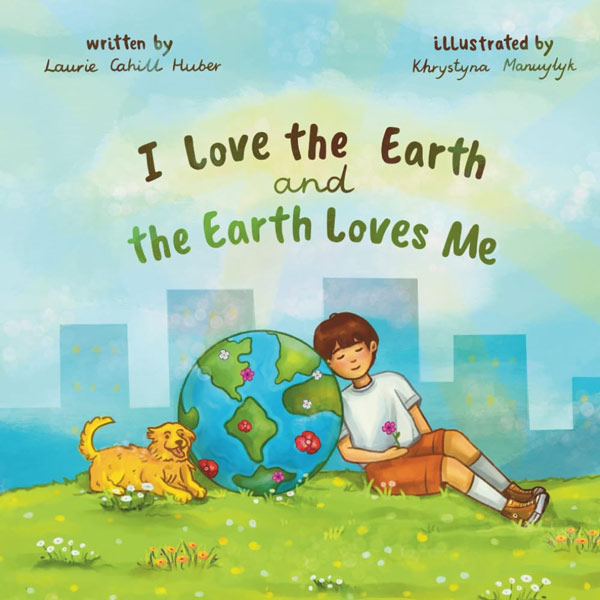
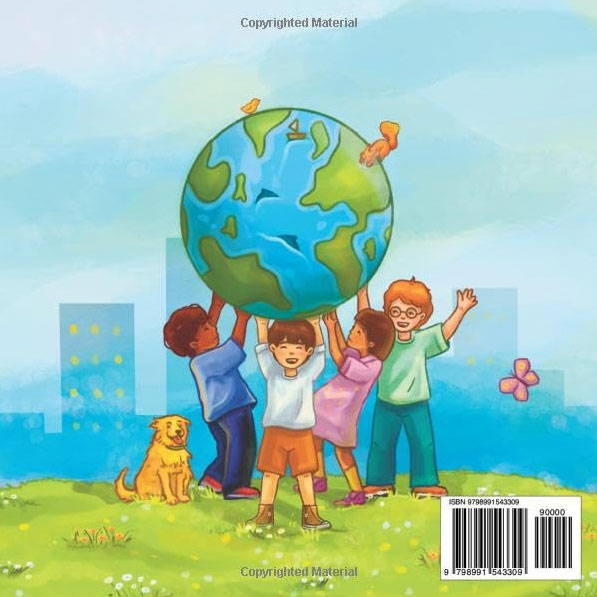
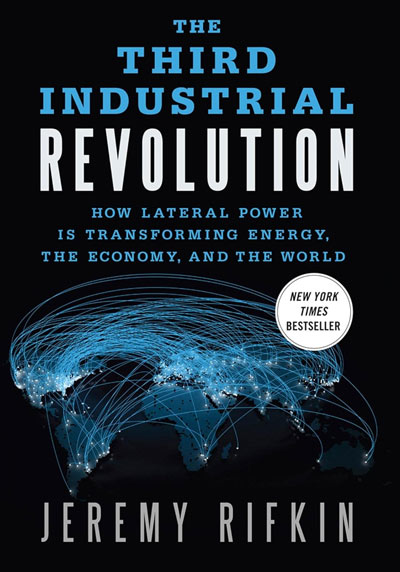
The Third Industrial Revolution
The Third Industrial Revolution by Jeremy Rifkin may be a little dated, it was published almost 12 years ago, but its underlying message is an important one. The first Industrial Revolution was powered by oil and other fossil fuels. As climate change brings increasing pressure on growing food and protecting our communities from fire and flood, the world is desperate for a sustainable economic plan for the future.
In the book, Jeremy Rifkin explores how Internet technology and renewable energy are merging to create the “Third Industrial Revolution.” His idea, to imagine hundreds of millions of people producing their own energy in their homes, offices, and factories, and sharing it with each other in an “energy internet,” along the lines of how we now create and share information online.
He describes how a Third Industrial Revolution could create thousands of businesses, millions of jobs, and usher in a fundamental reordering of human interactions, from hierarchical to lateral power, that could impact how we conduct commerce, govern society, and educate children.
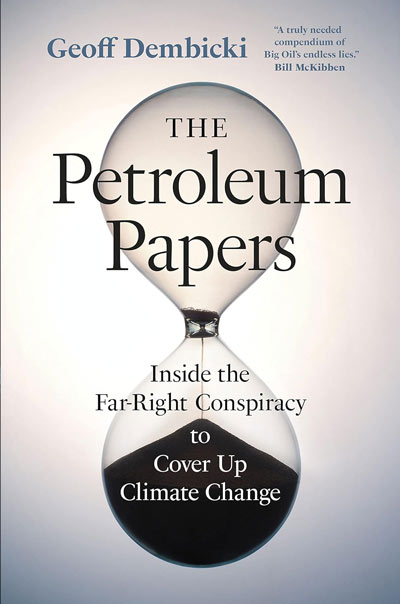
The Petroleum Papers
The Petroleum Papers by Geoff Dembicki. As an investigative journalist Geoff Dembicki shares shocking details behind the decades long coverup perpetrated by the petroleum industry. The idea for the book came to Dembicki while he watched a Congressional hearing in October of 2021. The heads of four major oil companies and the American Petroleum Institute were testifying before Congress about their apparent decades long effort to convince millions of people in the U.S. that there was no such thing as climate change.
His book is non-fiction, but it reads like a great story. While Dembicki lives in the U.S. he is from Canada and focuses on the incredible story of the oil sands in Alberta, Canada. Top American oil executives were told (in 1959!) by scientists that burning fossil fuels will cause catastrophic global warming, but they ignored that information. Instead, they developed one of the biggest, most polluting oil sources in the world–the oil sands in Alberta, Canada. In The Petroleum Papers, Dembicki uses confidential oil industry documents to uncover for the first time how companies like Exxon, Koch Industries, and Shell built a global communications project to protect oil sands profits–a misinformation campaign that continues to this day. He also tells stories of people fighting back: a Seattle lawyer who brought down Big Tobacco and is now going after Big Oil, a Filipina activist whose family drowned in a climate disaster, and a former Exxon engineer pushed out for asking hard questions.
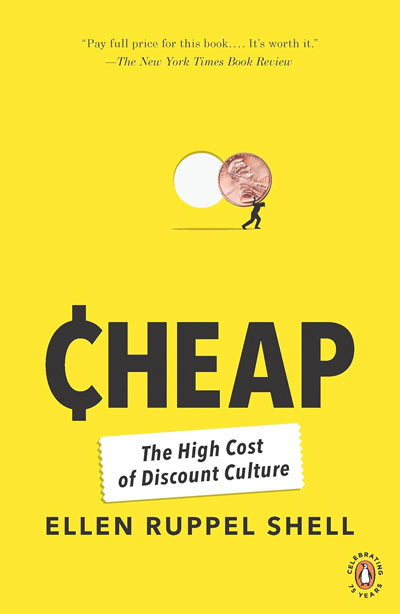
Cheap – The High Cost of Discount Culture
Cheap – The High Cost of Discount Culture by Ellen Ruppel Schell is focused primarily on the phenomena of the American movement away from craftsmanship, quality, and durability to low prices, bargains, and quantity. Schell looks deeply into the forces that drove away our manufacturing and drove up the number of stores—the transfer of our identity from makers to buyers.
The resulting shuttered factories and in turn the growth of and then shuttered strip malls as our purchasing moved to online; except for the “big box” stores that continue to thrive – has fueled excess consumption that, “blights our landscapes, escalates personal debt, lowers our standard of living, and even skews our concept of time.” Not covered so much in the book, but of great significance to Energy Shift, is the concurrent massive consumption of energy associated with the excess manufacturing, packaging, transporting, purchasing, and disposing of massive amounts of low-quality, low-price goods.
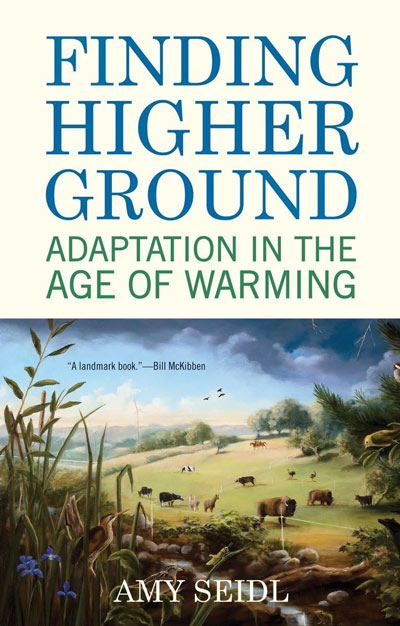
Finding Higher Ground: Adaptation in the Time of Warming
By Amy Seidl
Although much of the thinking about global warming and the climate change that warming brings, focuses on reducing our carbon footprint, the reality is that even if we were to immediately cease carbon dioxide emissions, we would still face climate change and its consequences. In Finding Higher Ground, Amy Seidl shares details about how humans and animals can adapt and persist despite these changes.
Seidl shares stories of adaptation from the natural world and from human communities. She offers examples of how plants, insects, birds, and mammals are adapting both behaviorally and genetically. While some species will be unable to adapt to new conditions quickly enough to survive, Seidl argues that those that do can show us how to increase our own capacity for resilience if we work to change our collective behavior. The book looks at climate change as an opportunity to establish new norms, inspiring readers to move beyond loss and instead to evolve.
